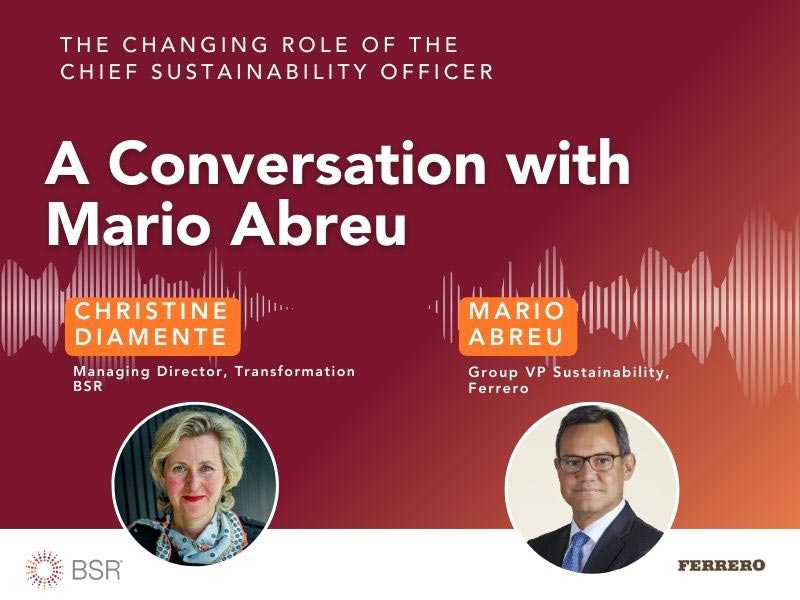
Authors
 BSR is pleased to welcome Sharan Burrow, an outspoken champion for workers and climate, as a plenary speaker at our 2020 Conference.
BSR is pleased to welcome Sharan Burrow, an outspoken champion for workers and climate, as a plenary speaker at our 2020 Conference.
The events of 2020—in particular the COVID-19 pandemic and its economic impacts—have exposed many existing structural inequities and highlighted the fact that our existing social contract is no longer fit for purpose. Sharan is a driving force in the global movement to create a dialogue between business, civil society, and government in order to forge a new social contract that advances social progress for all, including the transition to a net-zero economy that sustains jobs, livelihoods, and economic fairness.
Sharan was elected as the General Secretary of the International Trade Union Confederation (ITUC) in 2010. As Vice Chair of The B Team, she has spearheaded cross-sector efforts in promotion of inclusive economies, climate justice, corporate transparency, and workplace equality. In 2016, she helped to establish the ITUC’s Just Transition Centre, which brings together workers and their unions, communities, businesses and governments in social dialogue to ensure that labor has a seat at the table when planning for a just transition to a low-carbon world.
As BSR continues to discuss what a 21st-century social contract should look like with our members, partners, and community, we welcome Sharan’s point of view—in the Q&A below and at BSR20 next month.
In 2020, we’ve dealt with the impacts of COVID-19, witnessed a growing demand for social and racial justice, and seen the growing impacts of climate change around the world. As we look to the future and try to rebuild the economy, how important is it to create a new social contract between business, government, and people that both protects the rights of workers while also safeguarding the planet? What do you think the key elements of a new social contract should be?
A New Social Contract must bring a recovery with a resilience against future shocks that is built on jobs, living wages, and universal social protection. A recovery which is inclusive of women and young people without discrimination and sustains a living planet. Climate action and employment cannot be separated if we are to stabilize the planet and end exploitation inherent in an economic model where profit and shareholder value take priority.
The current model of business has resulted in a global workforce where only 40 percent of workers have formal employment and more than a third of them face precarious work. The ILO Centenary Declaration laid out the floor for a new social contract.
- A labor protection floor for all workers irrespective of their employment arrangement with fundamental rights, health and safety, adequate minimum wages, and maximum hours of work
- Universal social protection
- A transformative agenda for women, and
- Just transitions for climate action and new technologies.
The SDGs reinforce these and other elements of a just and sustainable future for all. The urgency to act is now, and the only thing stopping us is political will.
The ILO estimates that we lost nearly 300 million jobs between April and June this year. From the perspective of a labor leader, what issues must business urgently address if we are to successfully build a more just and sustainable future?
Business must change. There are many companies that are committed to the rights of workers, fair wages, and safe conditions with due diligence and grievance mechanisms to remedy violations. Tragically, there are many that are not and whose global supply chains are dehumanizing and exploitative. Decent work requires respect for rights and a commitment to shared prosperity.
Likewise, many businesses are committed to climate action to realize a net zero future—but too many are not. This is not a level playing field for domestic or global business, and regulation is required at all levels to ensure a fair competition floor. Core ILO Labour Standards with mandated due diligence to ensure respect for UN Guiding Principles on Business and Human Rights are a key part of the level playing field for business as are environmental standards.
And business must abide by fair taxation rules supporting the elimination of tax avoidance and evasion with a commitment to eliminate corruption. If we expect investment in jobs with government support for enabling green infrastructure, health, education, childcare and aged care, sustainable cities with mass transit, and repair of ecosystems amongst other vital initiatives—fair taxation sits at the heart of making that possible and rebuilding hope.
In BSR’s report, The Business Role in Creating the 21st-Century Social Contract, we focus in part on the need to generate inclusive low-carbon employment opportunities and to manage the impact on workers who are transitioning away from high-carbon roles. What policies are needed to support a just transition? What actions should businesses be taking to prepare their workers and the communities in which they operate?
Just Transition is vital to build trust in climate action. All industry sectors must transition so it must start with social dialogue: workers and, where relevant, governments at the table with employers co-designing the pathway to net zero emissions. The principal measures for Just Transition are not difficult:
- Protecting jobs wherever possible
- Secure pensions for older workers
- Income support, reskilling arrangements, and redeployment for displaced younger workers; and
- Investment in community renewal.
There can be no recovery and no resilience if we don’t stabilize the planet. It will take all of us.
Topics
Let’s talk about how BSR can help you to transform your business and achieve your sustainability goals.







